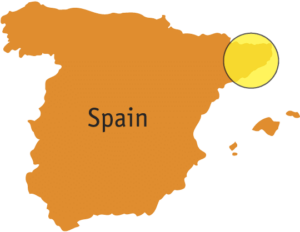by The Cowl Editor on November 2, 2017
News

By Ernie Andreoli ’18
News Staff
On Friday, October 27, the Catalan Parliament voted to declare independence from Spain. This unprecedented vote came almost a month after Catalonia’s lawmakers held a referendum for independence despite the Spanish government’s dissent.
Following the regional parliament’s vote, legislators in Madrid authorized Prime Minister Mariano Rajoy to dissolve the previously semi-autonomous region’s government in an effort to prevent Catalonia’s secession from Spain.
Minutes after the Catalan Parliament’s vote for independence, Spain’s Senate granted Rajoy the power to remove the region’s president, and hold new elections on Dec. 12. In a fervent speech delivered to senate members on Friday, Rajoy insisted that Catalonia’s intention to secede is “a clear violation of the laws, of democracy, of the rights of all, and that has consequences.”
In the 135-member Catalan Parliament, secessionists have a slight majority, but 70 votes were cast in favor of independence, with ten against, and two blank ballots.
While a number of pro-unity parliamentarians left the vote out of protest, this historic vote encapsulated a number of Catalans’ desire to separate from Spain. Thousands of people supporting independence gathered to watch the vote outside the Catalan parliament building in Barcelona while waving flags, embracing one another, and chanting “freedom.”
After Spain’s senate invoked a constitutional move to abrogate Catalonia’s autonomy, Rajoy’s cabinet is now in the process of drafting a plan to take power in Catalonia, and dismiss Catalan President Carles Puigdemont. Yet there is a great deal of uncertainty as to how these political maneuvers will fare against the Catalan people.
For a number of Providence College students studying abroad in Spain, Catalonia’s vie for independence has had a significant impact on their abroad experiences. According to Mikayla Williams ’19, who is currently studying in Barcelona, the Catalan pride in Barcelona has been ever-present through propaganda and protests.
Williams recounted that a number of Barcelona residents clanged on pots and pans outside their homes in an effort to showcase their support for Catalonia’s independence from Spain. “It is amazing to witness a community protest for what they want, in their eyes—democracy,” noted Williams. While support for independence has grown since Puigdemont officially supported Catalonia’s independence referendum on Oct. 1, a number of people in Madrid have been shocked by many Catalans’ desire to secede from Spain. According to Williams, in an effort to show support for unification and the country’s security, thousands of people gathered in the streets of Madrid chanting “viva la policia” following the Catalan parliament’s referendum.
While Rajoy and his cabinet are expected to take power in Catalonia through direct supervision of the Catalan police force, questions remain as to how this strategic move will fare with the people of Catalonia.
Because Catalonia is one of Spain’s most culturally and economically affluent regions, the region’s secession could undermine Spain’s social and economic development, as well as create a vulnerable autonomous government for Catalonia.
While Spain’s senate has authorized Rajoy and his cabinet members to exert control over the previously semi-autonomous region, uncertainties remain as to how Catalan secessionists will react to a political restructuring of the region.